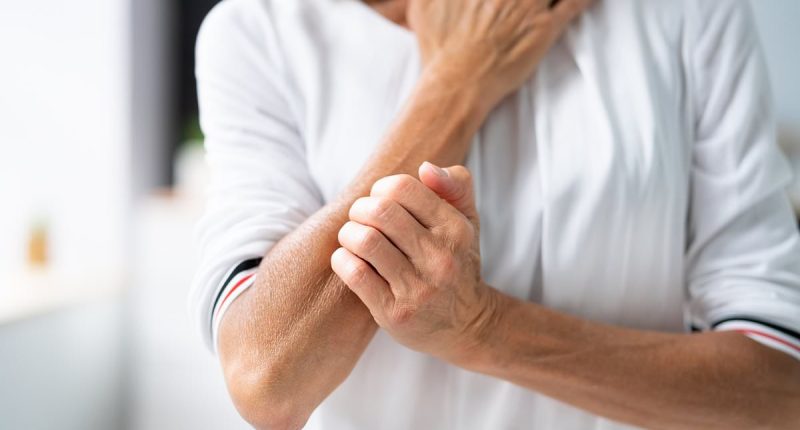Share this @internewscast.com
Researchers have discovered a surprising link between abdominal fat and painful psoriasis, a chronic inflammatory skin condition.
Studies have shown obesity is a risk factor for psoriasis, but never before have scientists established the waist and belly to be the most influential spots.
Psoriasis and obesity, which affects about 100million American adults, share the same biological pathway: chronic inflammation. Adipose (fat) tissue releases inflammatory chemicals that clash with the immune system, which can cause inflammation in the skin, and psoriasis’ trademark red, scaly rash.
The team of dermatologists from King’s College London analyzed data from over 330,000 white people living in the UK, including more than 9,000 with psoriasis, which affects roughly 7.5million Americans.
They examined 25 different body fat measures using traditional methods, such as calipers that pinch skin folds, and advanced imaging techniques, such as highly specialized X-ray scans, assessing how each was associated with psoriasis.
Researchers found the waist-to-hip ratio on a person was the strongest risk factor for psoriasis, but didn’t reveal why specifically that type of fat had the strongest association.
Dr Ravi Ramessur, lead investigator on the study, said: ‘Our research shows that where fat is stored in the body matters when it comes to psoriasis risk. Central fat — especially around the waist — seems to play a key role.
‘This has important implications for how we identify individuals who may be more likely to develop psoriasis or experience more severe disease, and how we approach prevention and treatment strategies.’

Psoriasis is an autoimmune skin condition that produces inflammatory chemicals, leading to a red, painful rash on the skin (stock image)
The researchers measured overall ‘central’ fat around the torso, encompassing subcutaneous fat right below the skin’s surface, and dangerous visceral fat that wraps around the organs.
The link between central fat and psoriasis remained consistent regardless of genetic predisposition, indicating that abdominal fat is an independent risk factor.
Dr Catherine Smith, senior author, said: ‘As rates of obesity continue to rise globally, understanding how different patterns of body fat influence chronic inflammatory conditions such as psoriasis is important.
‘Our findings suggest that central body fat contributes to psoriasis risk irrespective of genetic predisposition and reinforces the importance of measuring waist circumference and pro-active healthy weight strategies in psoriasis care.”
In addition to releasing inflammatory compounds, fat tissue hijacks the body’s balance of hormones.
The hormone leptin normally signals to the brain the body is full and it’s time to stop eating.
But fat cells overproduce this hormone, breaking that ‘stop eating’ signal.

The obesity rate among American adults increased from 21.2 percent in 1990 to 43.8 percent in 2022 for women and 16.9 percent to 41.6 percent for men
The overabundance of leptin also stimulates the production of inflammatory cytokines, leading to a psoriasis breakout of painful rashes and subsequent flare-ups in the skin.
In a related editorial, Dr Joel Gelfand, a dermatology expert at the University of Pennsylvania, highlights the promise of specific gut hormone therapies – mainly GLP-1 and GIP, which help control blood sugar, digestion, and hunger – as potential therapies for psoriatic disease.
These hormones, sold under brands like Ozmepic, Wegovy and Zepbound, are already used to treat diabetes, obesity, and obesity-related sleep apnea.
A separate 2024 NIH-funded report in the journal Psoriasis analyzed four studies involving 23 patients with both psoriasis and type 2 diabetes who took a GLP-1 receptor agonist drug.
Every study showed significant reductions in PASI scores, a measure of psoriasis severity.
Two studies showed fewer markers of inflammation in layers of the skin and reduced harmful immune responses.
Patients also reported improved quality of life.

Scientists found that the link between fat in the abdomen and psoriasis risk was consistent regardless of whether the people had a genetic predisposition
Now, researchers are exploring whether the drugs could also help manage psoriatic disease, possibly by tackling the inflammation and metabolic issues linked to psoriasis.
According to Dr Gelfand, the powerful link between obesity and psoriasis, as well as the evidence that GLP-1 drugs could alleviate symptoms, signals it’s time to launch clinical trials testing the drugs specifically for psoriasis.
He said: ‘The strong relationship between psoriasis and obesity and the emerging promise of glucagon-like peptide-1 receptor agonists (GLP1RA) for reducing psoriasis morbidity is a call to action for large scale clinical trials of GLP1RA monotherapy for treatment of psoriasis.
‘Our current paradigm of just focusing on the skin and joint manifestations when treating psoriasis is outdated in the context of our evolving understanding of the tight relationship of psoriasis, obesity, and cardiometabolic disease.’














